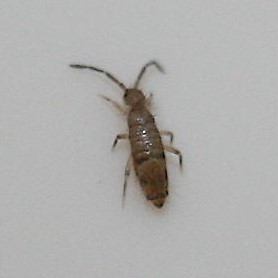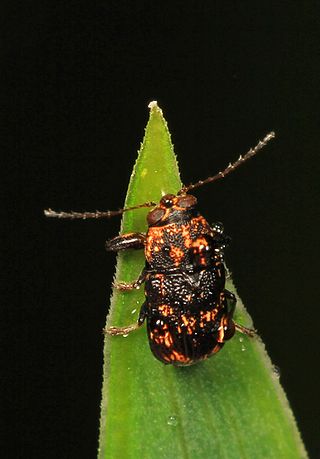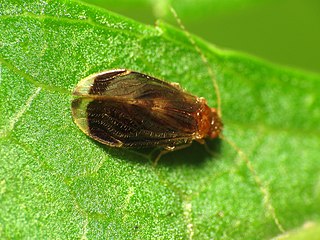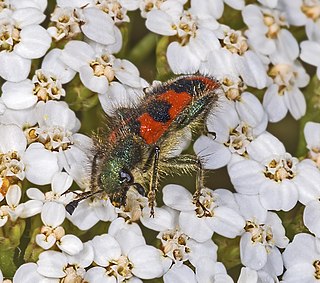
Genus is a taxonomic rank above species and below family as used in the biological classification of living and fossil organisms as well as viruses. In binomial nomenclature, the genus name forms the first part of the binomial species name for each species within the genus.

The Integrated Taxonomic Information System (ITIS) is an American partnership of federal agencies designed to provide consistent and reliable information on the taxonomy of biological species. ITIS was originally formed in 1996 as an interagency group within the US federal government, involving several US federal agencies, and has now become an international body, with Canadian and Mexican government agencies participating. The database draws from a large community of taxonomic experts. Primary content staff are housed at the Smithsonian National Museum of Natural History and IT services are provided by a US Geological Survey facility in Denver. The primary focus of ITIS is North American species, but many biological groups exist worldwide and ITIS collaborates with other agencies to increase its global coverage.

Entomobryidae, sometimes called "slender springtails", is a family of springtails characterised by having an enlarged fourth abdominal segment and a well-developed furcula. Species in this family may be heavily scaled and can be very colourful. The scale-less Entomobryidae are commonly caught in pitfall traps around the planet, and also occur in canopy faunas high up in trees. There are more than 1700 described species in Entomobryidae.

Phidippus californicus is a species of jumping spider. It is found in the southwestern United States and northern Mexico.

Phidippus octopunctatus is a jumping spider that occurs in the United States and Mexico, mostly in the Great Basin Desert. It is among the largest jumping spiders found in North America, approaching 25 millimetres (0.98 in) in body length. They are gray to brownish-gray in color.

Pallopteridae is a family of flies. The various species are collectively called flutter-wing flies, trembling-wing, or waving-wing flies, because of the striking vibration of the wings in many species. Over 70 species in about 15 genera are found in the temperate regions of the Northern and Southern Hemispheres.

Pachybrachis is a genus of scriptured leaf beetles in the family Chrysomelidae. There are at least 220 described species in Pachybrachis.

Amphipsocidae is a family of hairy-winged barklice in the order Psocodea. Most species are 3.0-4.5 mm long and have many setae (hairs) on the veins and margin of the forewing. The main veins of the forewing are usually lined with two rows of setae. Like the other members of the infra-order Caeciliusetae, they have a broad, flat labrum, with well defined edges.
The Catalogue of Life is an online database that provides an index of known species of animals, plants, fungi, and microorganisms. It was created in 2001 as a partnership between the global Species 2000 and the American Integrated Taxonomic Information System. The Catalogue is used by research scientists, citizen scientists, educators, and policy makers. The Catalogue is also used by the Biodiversity Heritage Library, the Barcode of Life Data System, Encyclopedia of Life, and the Global Biodiversity Information Facility. The Catalogue currently compiles data from 165 peer-reviewed taxonomic databases that are maintained by specialist institutions around the world. As of September 2022, the COL Checklist lists 2,067,951 of the world's 2.2m extant species known to taxonomists on the planet at present time.

The Encyclopedia of Life (EOL) is a free, online encyclopedia intended to document all of the 1.9 million living species known to science. It aggregates content to form "pages" for every known species. Content is compiled from existing trusted databases which are curated by experts and it calls on the assistance of non-experts throughout the world. It includes video, sound, images, graphics, information on characteristics, as well as text. In addition, the Encyclopedia incorporates species-related content from the Biodiversity Heritage Library, which digitizes millions of pages of printed literature from the world's major natural history libraries. The BHL digital content is indexed with the names of organisms using taxonomic indexing software developed by the Global Names project. The EOL project was initially backed by a US$50 million funding commitment, led by the MacArthur Foundation and the Sloan Foundation, who provided US$20 million and US$5 million, respectively. The additional US$25 million came from five cornerstone institutions—the Field Museum, Harvard University, the Marine Biological Laboratory, the Missouri Botanical Garden, and the Smithsonian Institution. The project was initially led by Jim Edwards and the development team by David Patterson. Today, participating institutions and individual donors continue to support EOL through financial contributions.

Dasypogoninae is a subfamily of robber flies in the family Asilidae. There are more than 60 genera and 520 described species in Dasypogoninae.

Campiglossa is a genus of fruit flies in the family Tephritidae. There are at least 190 described species in Campiglossa.

The Taiwanese brown-toothed shrew is a species of shrew in the tribe Nectogalini. It is found only in Taiwan. It prefers dense ground cover in forests and subalpine shrublands in high mountains of central Taiwan. Its placement in Episoriculus has been questioned, with genetic analysis finding that it is more basal within Nectogalini than other members of Episoriculus.
Anisostichus is a genus in the beetle family Carabidae. There are at least four described species in Anisostichus, found in South America.

Lachesilla is the main genus in the psocopteran family Lachesillidae. There are at least 310 described species in Lachesilla. Frequent species in the Northern hemisphere include Lachesilla quercus and Lachesilla pedicularia. Some species are localized: Lachesilla merzi has been collected only once in Spain and Lachesilla rossica, apart from the original specimens that were found in southern Russia, is only known from the Valley of the Allondon river, near Geneva, Switzerland.

Trichodes is a genus of checkered beetle belonging to the family Cleridae, subfamily Clerinae.

iNaturalist is an American 501(c)(3) nonprofit social network of naturalists, citizen scientists, and biologists built on the concept of mapping and sharing observations of biodiversity across the globe. iNaturalist may be accessed via its website or from its mobile applications. iNaturalist includes an automated species identification tool, and users further assist each other in identifying organisms from photographs and even sound recordings. As of 9 July 2024, iNaturalist users had contributed approximately 197,660,888 observations of plants, animals, fungi, and other organisms worldwide, and 290,007 users were active in the previous 30 days.
Tmesisternus octopunctatus is a species of beetle in the family Cerambycidae. It was described by E. Forrest Gilmour in 1949. It is known from Papua New Guinea.


















